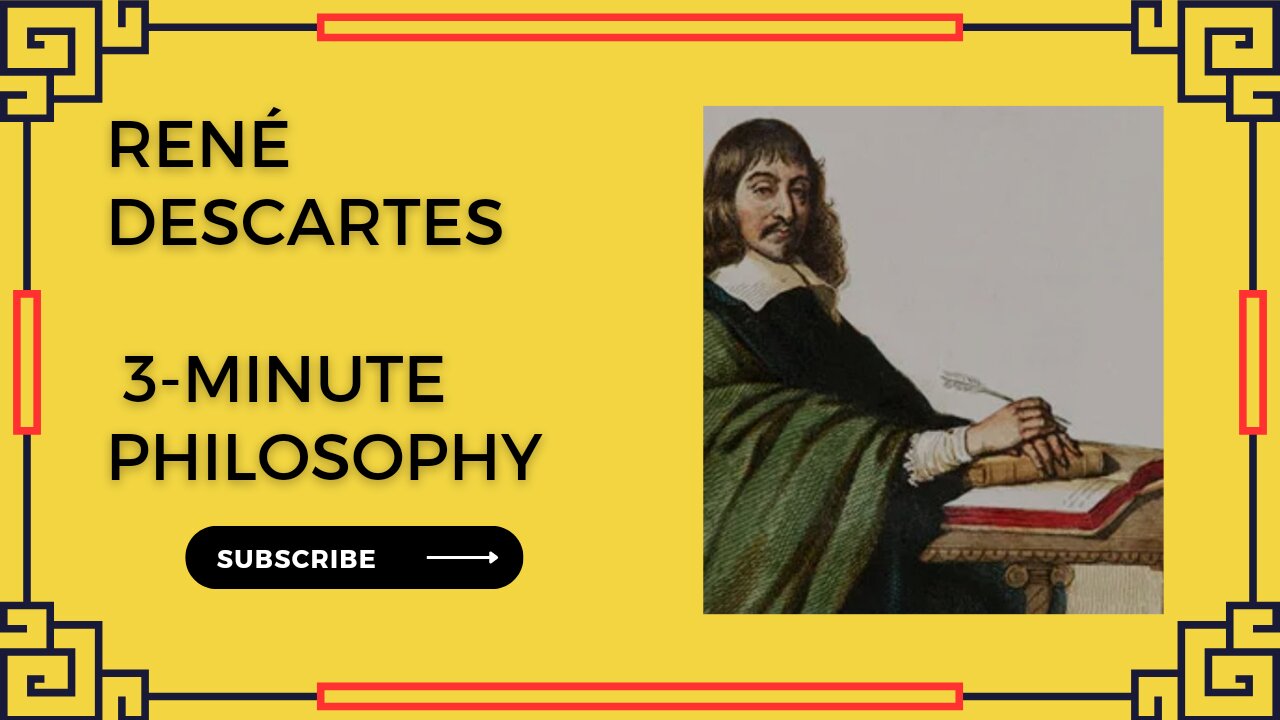Premium Only Content

René Descartes | 3-Minute Philosophy | Peak Intrigue #philosophy
Today we're going to delve into the life, philosophy, and views of one of the most famous philosophers of all time: René Descartes.
Born in 1596 in the town of La Haye en Touraine, France, Descartes lived during a time of great change in Europe. He was a mathematician, philosopher, and scientist who is best known for his work in the field of metaphysics, epistemology, and the philosophy of mind.
Descartes began his education at the Jesuit college of La Flèche, where he studied a range of subjects including mathematics, philosophy, and theology. After completing his studies, he spent several years traveling throughout Europe, learning from some of the most prominent thinkers of his time.
In 1628, Descartes settled in Holland where he spent the rest of his life. There he taught philosophy and mathematics and wrote some of his most famous works.
Descartes is most famous for his statement "Cogito, ergo sum" or "I think, therefore I am." This statement, which appears in his book "Meditations on First Philosophy," is a cornerstone of modern philosophy and represents Descartes' belief that the only thing we can truly know for certain is that we exist as thinking beings.
Descartes believed that the world around us is made up of two distinct substances: material substance and mental substance. Material substance includes things like rocks, trees, and animals, while mental substance includes thoughts, feelings, and consciousness. He believed that the two substances were separate and could exist independently of each other.
Another important aspect of Descartes' philosophy is his belief in the power of reason. He believed that reason was the only way to discover truth and that we should doubt everything until we have clear and distinct evidence to support our beliefs. This approach to knowledge is known as rationalism.
Descartes also made significant contributions to the field of mathematics. He is credited with developing the Cartesian coordinate system, which is used to plot points in two or three dimensions, and he made important contributions to the field of geometry.
Despite his many achievements, Descartes was not without his critics. Some philosophers argued that his emphasis on reason and doubt went too far, and that he was ignoring the importance of emotion and intuition. Others criticized his dualistic view of the world, arguing that it was too simplistic and failed to take into account the complexities of human experience.
Despite these criticisms, Descartes' influence on philosophy and science cannot be overstated. His emphasis on reason and doubt helped to lay the foundation for modern scientific inquiry, and his contributions to mathematics continue to influence the field to this day.
In terms of his personal life, Descartes was known for his love of solitude and his passion for mathematics. He spent much of his time writing and studying, and he was known for his rigorous work ethic.
Tragically, Descartes' life was cut short when he died in 1650 at the age of 53. He was buried in a church in Stockholm, Sweden, where he had been living as a guest of Queen Christina.
In conclusion, Rene Descartes was a brilliant philosopher, mathematician, and scientist who made important contributions to our understanding of the world around us. His emphasis on reason, doubt, and the power of the mind continues to influence philosophy and science to this day, and his legacy lives on as one of the greatest thinkers in history. Thank you for tuning in, and we hope you enjoyed this brief overview of his life and philosophy.
#philosophy #philosophers #philosopher #renedescartes #renédescartes #descartes #peakintrigue #motivation #3minutephilosophy
-
 1:01:10
1:01:10
VINCE
3 hours agoFirst Signs That Trump's Tariffs Are Paying Off | Episode 15 - 04/04/25
171K109 -
 1:09:14
1:09:14
BonginoReport
6 hours agoMoral Relativism, Tesla Terrorists & the Left: Jack Posobiec and Evita Unveil the Truth (Ep.175)
104K52 -
 LIVE
LIVE
Major League Fishing
2 days agoLIVE! - MLF Bass Pro Tour: REDCREST - Day 2
351 watching -
![🔴[LIVE] Stock Market Crash: From BAD To WORSE! || The MK Show](https://1a-1791.com/video/fww1/48/s8/1/f/N/-/y/fN-yy.0kob-small-The-MK-Show-Apr.-4th.jpg) LIVE
LIVE
Matt Kohrs
12 hours ago🔴[LIVE] Stock Market Crash: From BAD To WORSE! || The MK Show
1,298 watching -
 LIVE
LIVE
The Big Mig™
4 hours agoPardon US: Justice For All w/ J6’r Daniel Goodwyn
3,710 watching -
 58:59
58:59
The Hannah Faulkner Show
14 hours agoHannah Faulkner and Dr. Simone Gold | NEW FDA DIRECTOR?!
2.16K1 -
 40:21
40:21
Randi Hipper
1 hour agoVOLATILE WEEKEND AHEAD FOR BITCOIN!
19K -
 32:20
32:20
Coin Stories with Natalie Brunell
16 hours agoBitcoin Revolution in Washington: Senator Lummis on U.S. Debt, Gold, Stablecoins & Dollar Dominance
22.2K3 -
 2:04:58
2:04:58
Game On!
16 hours ago $5.68 earnedFeel Good Friday! Breaking down the Final 4!
36.3K -
 16:38
16:38
T-SPLY
20 hours agoDemocrats Are At President Trump For "Liberation Day"
94.8K64